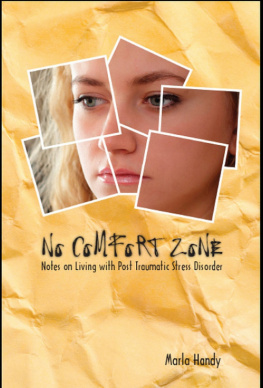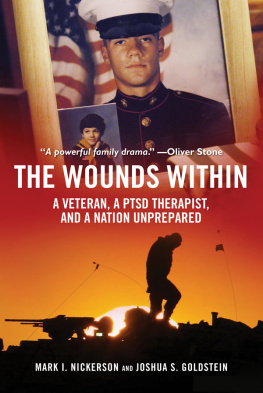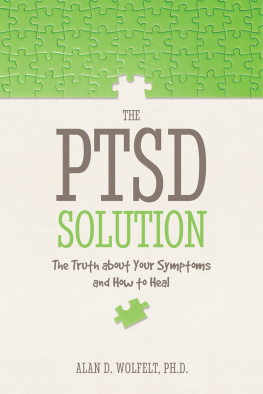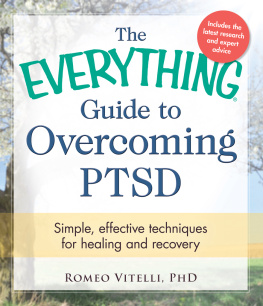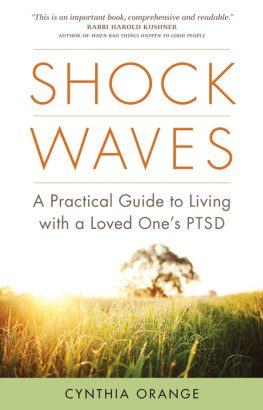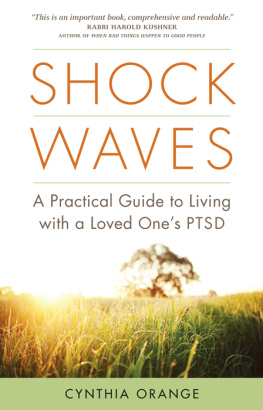At War with PTSD
At War with PTSD
Battling Post Traumatic Stress Disorder with Virtual Reality
Robert N. McLay, M.D., Ph.D.

2012 The Johns Hopkins University Press
All rights reserved. Published 2012
Printed in the United States of America on acid-free paper
9 8 7 6 5 4 3 2 1
The Johns Hopkins University Press
2715 North Charles Street
Baltimore, Maryland 21218-4363
www.press.jhu.edu
Library of Congress Cataloging-in-Publication Data
McLay, Robert N.
At war with PTSD : battling post traumatic stress disorder with virtual reality /
Robert N. McLay.
p. ; cm.
Includes index.
ISBN-13: 978-1-4214-0557-5 (hdbk. : alk. paper)
ISBN-10: 1-4214-0557-1 (hdbk. : alk. paper)
ISBN-13: 978-1-4214-0593-3 (electronic)
ISBN-10: 1-4214-0593-8 (electronic)
I. Title.
[DNLM: 1. Stress Disorders, Post-TraumatictherapyUnited States. 2. Iraq War, 2003United States. 3. Military PersonnelpsychologyUnited States.
4. PsychotherapymethodsUnited States. 5. User-Computer InterfaceUnited States. WM 172.5]
616.85212dc23 2011042881
A catalog record for this book is available from the British Library.
Special discounts are available for bulk purchases of this book. For more information, please contact Special Sales at 410-516-6936 or specialsales@press.jhu.edu .
The Johns Hopkins University Press uses environmentally friendly book materials, including recycled text paper that is composed of at least 30 percent post-consumer waste, whenever possible.
Contents
At War with PTSD
Prologue
THE desert wind was picking up as we drove down the main road between the airport and Baghdad. The drive had otherwise been quiet, with only the rumble of the Humvees diesel engine vibrating through the floorboards. To my right, a statue of Saddam Hussein stood lonely in an otherwise empty stretch of desert. Sand kicked up by a mixture of the weather and the wheels of the convoy made it difficult to make out the stone face, so we drove by unaware of whether the dictators eyes focused in our direction.
A boom in the distance sounded like a mortar, but my ears were not good enough to tell whether it was friendly or hostile. Smoke rose from the horizon. The Black Hawk helicopter that had escorted us on our path rushed off noisily, presumably going to investigate. The helicopters departure left us without air cover as we approached an overpass. The whole situation made me nervous, but then so did just about everything here. As Dr. McCoy of Star Trek might say, Im a doctor, not a combat Marine.
They say you never hear the sound of the gunshot that kills you, but two seconds later, another shell came in with a boom and howl of death. I did not feel the vehicle take the brunt of the impact, but a long crack appeared in the windshield. The Humvee that had been in front of us seemed to vanish, replaced by a smoking heap of rubble. The sound of gunfire was everywhere, interspersed with the loud radio chatter narrating the chaos around us.
Fire coming in. Fire coming in. One vehicle down. We are in an ambush.
Are you requesting backup?
We are requesting backup! Open fire!
Roger. Take evasive action as friendly fire comes in.
I instinctively ducked as something whizzed by, seemingly inches above my head. The world disappeared momentarily into the quiet blackness of the Humvees interior. When I looked up, we were surrounded. Two men, their faces wrapped in scarves, were standing not fifteen feet from the side of the road. They stood fixed, almost comically exposed, their only defense a suicidal offense of blazing guns.
Why were we not shooting back? The Humvee barreled on, passing within inches of the gunmen, who did not flinch. The whole world turned green, and the Iraqis seemed to flash back and forth between two positions in front of and behind our vehicle.
They hovered there, an endless loop.
The software still has a few glitches, said Dr. Jim Spira as I took off the headset and returned from virtual Baghdad to the quiet of his San Diego office.
I shrugged. Im sure you can fix the bugs, but I still dont understand how this virtual reality stuff is going to help combat Veterans get over post traumatic stress disorder.
1
Why This Book Was Written
SERGEANT Bigman was a Ranger, and he lived up to his title and his name. The man was six-foot-six, solid muscle. He came into my office looking angry and irritated to be there. He limped. I was more than a little scared, and I tried not to focus on the earlier words of my boss, Captain K.
This is one of the best-trained killers on the planet. Everyone else in his unit was slaughtered, and he was captured and tortured by al-Qaeda for weeks. I dont know how he escaped, and I suspect that the men who would have been there to actually see it are dead. He could snap your neck before anyone could get into your office to save you. If thats not enough to make you careful, remember that hes a certified American hero, and every general on the West Coast is looking at what happens to him. So watch what you say.
I started with hello.
He started with, You know, I never believed in this PTSD stuff. I always thought it was a sorry excuse to get out of work, but I cant sleep. My CO said I had to come and talk to you, so you have one hour, Sir.
I offered him a chair in my cluttered office, noting that even this exceptional man exhibited the familiar mix of irritability restrained by military discipline. The PTSD of which he spoke was post traumatic stress disorder, an affliction the military was trying to get a grip on in the face of ongoing wars in Iraq and Afghanistan. I was one of the Navys newest-minted so-called experts in the field. I had recently completed a psychiatry residency and, by virtue of having an extra doctorate in stress research, had been placed in charge of a program that tried to push the edges of what we could do for this disorder.
Your commanding officer cant actually order you to come here, I said. There are very specific rules for that. You can only be compelled to seek treatment if you are judged to be a danger to yourself or others, and Ive not been informed of anything of the like.
So I can go if I want to?
Yes.
He stayed anyway, at least for the hour, plus one more. Id been given extra time with him because he was, as Captain K had indicated, a certified hero. You could read that from the medals on his chest: a Silver Star, a Purple Heart, and, recently awarded, the Distinguished Service Cross, a decoration second only to the Congressional Medal of Honor. So far, they hadnt handed out that last celestial honor, no matter the acts of valor. On this mans chest, you could see indications of the most noteworthy actions of any Soldier serving. In his eyes, you could see more. This was a true hero and truly human. This was a strong man in pain.
Sergeant Bigman stands out in my mind because he was emblematic of a generation of Service MembersSoldiers, Sailors, Airmen, and Marineswho ended up in my office. He was not the only tough guy to suffer with post traumatic stress disorder. There were many others, some Special Operation supermen like him, others frail from old wounds reopened by the strains of military service. Most were people like you and me, neither tough nor brittle, who had found themselves with terrible events stuck in their heads that dominated their lives.
The military did what it could for these injured men and women. Some people have the impression that PTSD is an incurable tragedy, a mental scar that generals and admirals choose to ignore because it is a battle that cannot be seen and thus could not be won. I cant testify for the entire system, but I will say that at my medical center that wasnt the case. I saw that we could make a difference. Many people got better, went back to their lives, and were stronger for it. But not all.
Next page

